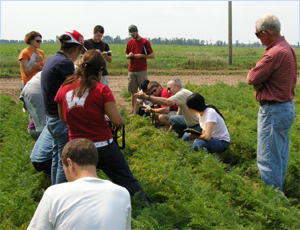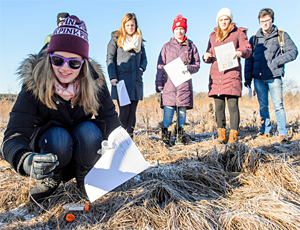This important relationship between faculty and growers’ needs has continued to be a major strength in our Department and in the College of Agricultural and Life Sciences.
Current members of the Department are dedicated to advancing knowledge of plant-microbe interactions while supporting food production and environmental security by addressing plant disease control, grower and consumer needs, and environmental sustainability.
Department personnel have long been recognized for their leadership roles in the biological sciences, and plant pathology in particular:
| 9 | Faculty members have served as president of the American Phytopathological Society. |
| 7 | Faculty members have been elected into the National Academy of Sciences. |
| 1 | Faculty member served as President of the International Society for Plant Pathology. |
| 1 | Faculty member served as President of the American Institute of Biological Sciences. |
The Department offers undergraduate, MS and Ph.D. degrees in Plant Pathology.
eCALS Articles About the Department
Seminars This Month
Department Seminars
* Indicates seminar will be held on Thursday.
Friday @ 4 Seminars
Justice, Equity, Diversity, and Inclusion (JEDI) Department Events

Undergraduate Programs
Our programs combine relevant course work with hands-on experience for a one-of-a-kind educational experience that not only educates students, but trains future leaders.
Learn More About Undergraduate Programs
 Graduate Programs
Graduate Programs
The strength of our graduate programs is based on an internationally recognized faculty, real-world field opportunities, and on the excellence of supporting disciplines.
Learn More About Graduate Programs
 Research
Research
We’re proud to be the home of exceptional faculty, staff, and graduate students who maintain excellence in plant pathology research.
Photo by Dennis Halterman, UW–Plant Pathology
 Extension/Outreach
Extension/Outreach
Our Extension and Outreach faculty and staff members are an important link between the members of the public that use our research products and the communities of scientists who create new knowledge.
Photo by Michael P. King/UW–Madison CALS
Values
Our department values diversity, inclusion, integrity, community, and respect as an integral part of the academic culture. See our Diversity resources on the menu above the photos.
Mission
Our mission is to be a world leader in research, teaching, and extension involving plant health, while serving the changing needs of society, the environment, and the University.
Diversity
Our department values diversity, inclusion, integrity, community, and respect as an integral part of the academic culture. See our Diversity resources.
Land Acknowledgement Statement
The University of Wisconsin-Madison occupies Ho-Chunk Land, a place their nation has called Teejop (Day-JOPE) since time immemorial. In an 1832 treaty, the Ho-Chunk were forced to cede this territory. Decades of ethnic cleansing followed when both the federal and state government repeatedly, but unsuccessfully, sought to forcibly remove the Ho-Chunk from Wisconsin.
This history of colonization informs our shared future of collaboration and innovation. Today, UW-Madison respects the inherent sovereignty of the Ho-Chunk Nation, along with the eleven other First Nations of Wisconsin.
Please take a moment to consider the many legacies of violence, displacement, migration and settlement that bring us together here today. And please join us in uncovering such truths every day. Learn more about the Department’s Mission and Values.
Giving Back
Whether you are an alumni, parent of a student, or believe in our mission, chances are you share our priorities: providing science-based research, instruction, and extension that supports plant pathology across the state of Wisconsin and beyond.
To do that, we rely on the support of our alumni and friends. Your generous contribution will help maintain and strengthen current programs and can make a significant difference in the educational experience of students.
Click to See Photos of Our Department








Photo Gallery Captions and Credits:
- Students inoculate cabbage, tobacco and zinnia plants in a Plant Pathology 123 lab section. Photo by Michael P. King/UW–Madison CALS.
- Professor Caitilyn Allen teaches Plant Pathology 123 (Plants, Parasites and People). Photo by Michael P. King/UW–Madison CALS.
- Professor Amanda Gevens, Plant Pathology Department Chair, poses for a portrait in a potato field at Alsum Farms and Produce near Arena, Wis. Photo by Michael P. King/UW–Madison CALS.
- Associate Professor Aurelie Rakotondrafara. Photo by Sevie Kenyon/UW-Madison CALS.
- Students examine Petri dishes in a Plant Pathology 123 lab section. Photo by Michael P. King/UW–Madison CALS.
- Apples inoculated by Dianiris Luciano-Rosario, a Plant Pathology PhD student. Luciano-Rosario, with mentor Nancy Keller, is supported by the Robert H. and Carol L. Deibel Distinguished Graduate Fellowship in Food Safety Research for graduate students pursuing food-safety-related research in the laboratories of faculty who are part of the executive committee or affiliated faculty of the Food Research Institute. Photo by Michael P. King/UW–Madison CALS.
- Tomatoes grow in a King Hall greenhouse as part of a Plant Pathology study. Photo by Michael P. King/UW–Madison CALS.
- Associate Professor Damon Smith accepts the Pound Extension Award from Dean Kate VandenBosch during the 2019 CALS Awards ceremony. Photo by Michael P. King/UW–Madison CALS.
